Feb 26, 2016 | Non categorizzato
Download Call for papers Twenty years ago, in 1996, Chiara Lubich was awarded an Honorary Doctorate in Social Sciences from the Catholic University of Lublin in Poland, for having promoted dialogue as the key driving force for peacekeeping and peace-building in every context. Chiara Lubich’s ‘charism of unity’ is at the forefront of dialogue today. The theory and praxis of dialogue has influenced the lives of many people of different cultures and religions, who have committed themselves to her spiritual vision that is embodied in the culture of unity. In a world where ethnic and religious differences often lead to violent conflicts, the spread of the charism of Chiara Lubich has contributed to constructive dialogue among persons, generations, social classes and nations. Five areas of interest have been identified. 1. Dialogue among communities: between charism and institutions 2. Conflict resolution through dialogue 3. The agents of political change and participation processes 4. Individual processes, interpersonal and intergroup levels involved in conflict management and its prevention 5. Dialogue among disciplines and transdisciplinarity Preference will be accorded those contributions able to use multidisciplinary approaches, coming from psychology, economics, pedagogy, politology, sociology and communication studies. A particular characteristic of innovative submissions should consist in a disciplined effort to bridge gaps between theory and practices. Only new and unpublished papers, which can bring added value to the empirical, theoretical, prescriptive and practical understanding and creative engagement of conflict and dialogue, will be selected. The study of the methodological implications of the different forms of conflicts has provoked increasing interest in many disciplines: psychology, economics, sociology, education and media studies, management and organizational studies, human rights and so on. Today’s multi-faith and multicultural society has to cope with a global challenge: mutual understanding and resolving conflicts. In our contemporary world, dialogue is hailed as a progressive necessary force, and is heralded as the main currency of statecraft, diplomacy, negotiation, mediation and peace-building. Hence, experts from different backgrounds agreed that it is imperative to explore intercultural and interreligious dialogue as key to promote mutual understanding among people, cultures, institutions and religions. Call for papers Chiara Lubich Jubilee Conference Programme Congress Organizers Hotel Accommodation Registration Form Sponsors
Keynote speakers:
- Adam Biela, psychology and sociology (John Paul II Catholic University of Lublin, Poland)
- Catherine Belzung, neurobiologist (University François Rabelais of Tours, France)
- Mauro Magatti, sociologist (Catholic University of Sacred Heart of Milan, Italy)
- Katarzyna Olbrycht, pedagogist (University of Silesia, Katowice, Poland)
- John Raven, psychology, The University of Manchester, Scotland and John Paul II Catholic University of Lublin, Poland
- Marina Santi, pedagogist (University of Padova, Italy)
- Bogusław Śliwerski, pedagogist (Chairman of the Committee of Pedagogical Sciences PAN, Poland)
- Krzysztof Wielecki, sociologist (Cardinal Stefan Wyszynski University, Warsaw, Poland)
- Stefano Zamagni, economist (University of Bologna, Italy)
Important dates:
30th March 2016 – Deadline for submissions of abstracts and registration 20th April 2016 – Reply from the scientific committee 20th May 2016 – Deadline for submissions of extended papers and payment
Contacts:
For the congress registration and the paper submission, please email to: congresslublin2016@gmail.com web: http://www.kul.pl/art_31023.html
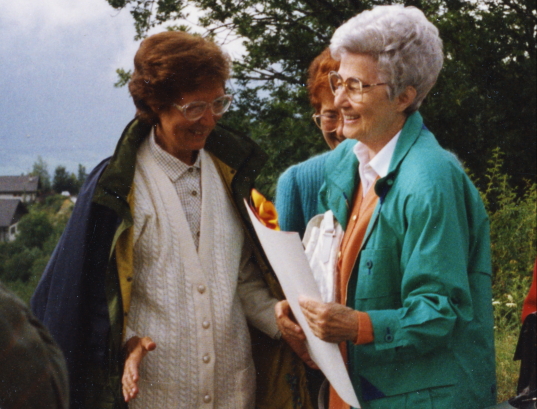
Feb 26, 2016 | Non categorizzato
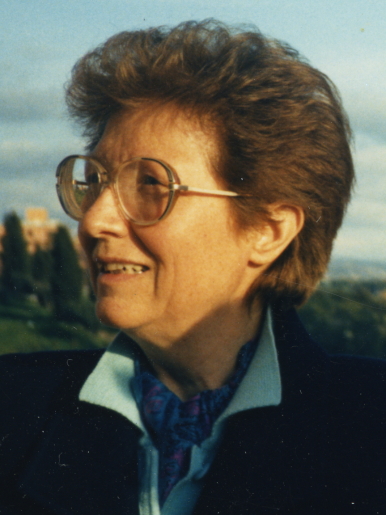 “December 1948. This evening, the whole crème of Catholic society in Rovereto was gathered in my father’s study: the presidents of the Catholic Youth, the Saint Vincent Society, the Daughters of Mary, the Franciscan Third Order and naturally the pastor. Plus, eighteen year-old me was there as the president of Student Youth. The speaker was Valeria Ronchetti. There was something in her that took me by surprise. She talked about God, but in a way that I’ve never heard any other person talk – until then. It wasn’t anything external as with a scholar; Valeria possessed God! She expressed something that urged her from the heart and that overflowed with force . . . I was in a state of shock. It was a war story . . . They were experiences of what she, with her friends, had found in the Gospel, how they had discovered God who is Love. It was a torrent of living water that completely engulfed me. In the candlelight – since the electricity had gone out – a quite serious-looking, elderly gentleman asked her in a rather ironic tone: ‘But aren’t you afraid, Miss, to excite the youth in this way? And if it’s just a flash in the pan?’ Valeria was a really enthusiastic type of person, all fire in her words and in her answers. She jumped to her feet and responded with energy: ‘What? Aren’t you afraid of exciting the youth over sport, music, paintings, mountains – all those beautiful things that pass away? And you’re afraid of exciting them over God who is the only thing that remains?’
“December 1948. This evening, the whole crème of Catholic society in Rovereto was gathered in my father’s study: the presidents of the Catholic Youth, the Saint Vincent Society, the Daughters of Mary, the Franciscan Third Order and naturally the pastor. Plus, eighteen year-old me was there as the president of Student Youth. The speaker was Valeria Ronchetti. There was something in her that took me by surprise. She talked about God, but in a way that I’ve never heard any other person talk – until then. It wasn’t anything external as with a scholar; Valeria possessed God! She expressed something that urged her from the heart and that overflowed with force . . . I was in a state of shock. It was a war story . . . They were experiences of what she, with her friends, had found in the Gospel, how they had discovered God who is Love. It was a torrent of living water that completely engulfed me. In the candlelight – since the electricity had gone out – a quite serious-looking, elderly gentleman asked her in a rather ironic tone: ‘But aren’t you afraid, Miss, to excite the youth in this way? And if it’s just a flash in the pan?’ Valeria was a really enthusiastic type of person, all fire in her words and in her answers. She jumped to her feet and responded with energy: ‘What? Aren’t you afraid of exciting the youth over sport, music, paintings, mountains – all those beautiful things that pass away? And you’re afraid of exciting them over God who is the only thing that remains?’  Total silence: I was completely taken. The mountains, music, paintings . . . Hadn’t I myself tried all of that? I had tried every beautiful and wholesome thing you could ask for, it had completely occupied me for years even, but none of it had ever really filled me up. I had always been left unsatisfied in my search. Well, then, here was the point . . . this is what I sought: it was God who was the answer to that recent period of dissatisfaction, of loneliness, of the confusion among my friends, of activism, of boredom . . . Everyone left my father’s study smiling, exchanging cheerful goodbyes with Valeria. But I didn’t really think we had actually understood what she was telling us. I asked myself: if she could have what she had just talked about – and it was clear that she did – why can’t I have it too? And at this point I recall a saying attributed to Saint Augustine: ‘If this one and that one, then why not me?’ I extended my hand to Valeria and told her: ‘I want to do what you have done, help me!’ We said goodbye and agreed to meet the next day. And the adventure began!” Source: Città Nuova online
Total silence: I was completely taken. The mountains, music, paintings . . . Hadn’t I myself tried all of that? I had tried every beautiful and wholesome thing you could ask for, it had completely occupied me for years even, but none of it had ever really filled me up. I had always been left unsatisfied in my search. Well, then, here was the point . . . this is what I sought: it was God who was the answer to that recent period of dissatisfaction, of loneliness, of the confusion among my friends, of activism, of boredom . . . Everyone left my father’s study smiling, exchanging cheerful goodbyes with Valeria. But I didn’t really think we had actually understood what she was telling us. I asked myself: if she could have what she had just talked about – and it was clear that she did – why can’t I have it too? And at this point I recall a saying attributed to Saint Augustine: ‘If this one and that one, then why not me?’ I extended my hand to Valeria and told her: ‘I want to do what you have done, help me!’ We said goodbye and agreed to meet the next day. And the adventure began!” Source: Città Nuova online

Feb 26, 2016 | Focolare Worldwide
 “I am a clerk and I live in Catanzaro. While participating in a meeting with friends who are committed to social work, I got to know that some young foreigners living in a centre for refugees, needed bicycles to go to work. I remembered that in my garage there were two mountain bikes, still in good condition. These bikes meant a lot to me, since they reminded me of the many long mountain excursions I had with my son. Without hesitating I raised my hand to offer them. But to have them brought to the destination, there some difficulties to overcome. Sometime later I found out that these friends had organised for the end of January, a three-day convention in a touristic village near the residence of the refugees, and in which I was invited to participate. You cannot imagine the joy I felt with this news. I myself could bring these bikes – at zero time frames and costs – and furthermore I could deliver them directly to the beneficiaries and have the chance to meet them. There was, however, another hindrance: the bikes were too bulky and I couldn’t fit them into the boot of my car. Not knowing what to do, I asked a neighbor who deals with used objects, if he had a solution. But when he found out that I wanted to give the bikes to refugees, he started saying that it was better to give them to him since he would earn something, and that he thought “it was not opportune to help these strangers who come to our country to grab from us the little job opportunities there are, and create many problems and social strife.” But on seeing that I kept my grounds on my decision, he said that the car of a common friend of ours had two bike racks, and which was exactly what I needed. When asked, this friend instead was very willing and glad to give me his bike rack. Things proceeded at best. On the set day, four young refugees came to the place of our seminar to retrieve the bikes. The minute they saw the bikes that were still mounted on the top of the car, I saw their eyes light up. They had perhaps thought of retrieving some old rusty bikes, and instead these were nice, new and in perfect working order. We were all happy. Then, shyly, but with great dignity they thanked us saying that they were poor and had nothing to give us in return, but that the same evening they would return to sing their songs with their drum, during the Eucharistic celebration. I am convinced that the friendship that was established will remain.” (Domenico, Italy)
“I am a clerk and I live in Catanzaro. While participating in a meeting with friends who are committed to social work, I got to know that some young foreigners living in a centre for refugees, needed bicycles to go to work. I remembered that in my garage there were two mountain bikes, still in good condition. These bikes meant a lot to me, since they reminded me of the many long mountain excursions I had with my son. Without hesitating I raised my hand to offer them. But to have them brought to the destination, there some difficulties to overcome. Sometime later I found out that these friends had organised for the end of January, a three-day convention in a touristic village near the residence of the refugees, and in which I was invited to participate. You cannot imagine the joy I felt with this news. I myself could bring these bikes – at zero time frames and costs – and furthermore I could deliver them directly to the beneficiaries and have the chance to meet them. There was, however, another hindrance: the bikes were too bulky and I couldn’t fit them into the boot of my car. Not knowing what to do, I asked a neighbor who deals with used objects, if he had a solution. But when he found out that I wanted to give the bikes to refugees, he started saying that it was better to give them to him since he would earn something, and that he thought “it was not opportune to help these strangers who come to our country to grab from us the little job opportunities there are, and create many problems and social strife.” But on seeing that I kept my grounds on my decision, he said that the car of a common friend of ours had two bike racks, and which was exactly what I needed. When asked, this friend instead was very willing and glad to give me his bike rack. Things proceeded at best. On the set day, four young refugees came to the place of our seminar to retrieve the bikes. The minute they saw the bikes that were still mounted on the top of the car, I saw their eyes light up. They had perhaps thought of retrieving some old rusty bikes, and instead these were nice, new and in perfect working order. We were all happy. Then, shyly, but with great dignity they thanked us saying that they were poor and had nothing to give us in return, but that the same evening they would return to sing their songs with their drum, during the Eucharistic celebration. I am convinced that the friendship that was established will remain.” (Domenico, Italy)
Feb 26, 2016 | Non categorizzato, Word of
God’s kingdom is Jesus present among us. We experience this when we love one another. He is almighty and conquers every evil.
This is what the Jews of the time of Jesus were waiting for: the arrival of God’s kingdom. As soon as he began going around the villages and towns, Jesus started to proclaim: ‘The kingdom of God has come near to you’ (Lk 10:9). Then immediately after that: ‘
The kingdom of God has come to you’; ‘the kingdom of God is among you’ (Lk 17:21).
In the person of Jesus, God’s very self had come into the midst of God’s people and, decisively and with strength, taken back control of history so as to lead it to its goal. Jesus’s miracles were a sign of this. In the person of Jesus, God’s very self had come into the midst of God’s people and, decisively and with strength, taken back control of history so as to lead it to its goal. Jesus’s miracles were a sign of this.
In the Gospel passage that this Word of Life comes from, Jesus had just healed a man who was mute, freeing him from the devil who held him prisoner. It was the demonstration that he had come to conquer evil, every evil, and finally establish the kingdom of God. This term ‘the kingdom of God’ was the Jewish people’s way of saying that God acted for the sake of Israel, freeing the people from every form of slavery and evil, guiding them to justice and peace, flooding them with joy and good things. This was the act of that God who Jesus revealed as ‘Father’ – mysterious, loving and full of compassion, aware of the needs and sufferings of each of his children. We too need to hear Jesus’s proclamation: ‘The kingdom of God has come to you.’ Looking around us we often have the impression that the world is dominated by evil, that the violent and the corrupt have the upper hand. At times we feel ourselves at the mercy of hostile forces, of dangerous events stronger than we are. We feel impotent in the face of wars and environmental calamity, of massacres and climate change, of migration and financial and economic crises. Yet this is where Jesus’s proclamation is set. It invites us to believe that he, right now, is conquering evil and is establishing a new world. In the month of March twenty five years ago, speaking to thousands of young people, Chiara Lubich entrusted them with her dream, ‘it is possible to make the world a better place…. almost a single family, as if belonging to just one country.’ Then as now this looked like a utopia. For the dream to become reality, however, she invited them to live mutual love, in the certainty that acting like this they would have had ‘Christ among you, Christ himself, the Almighty, and from him you can hope for all things.’ Yes, it is he who is the kingdom of God. And so, what do we do? Act in such a way as to have him always in our midst. Chiara went on to say: He himself will work with you in your countries because he will, in a certain way, come again into the world wherever you meet, because you will make him present through your mutual love, through your unity. And he will enlighten you about all that is to be done. He will guide you, he will sustain you, he will be your strength, your fervour, your joy. Because of him, the world around you will be converted to living in harmony; every division will be healed…. Love, therefore, love among you and love sown in many corners of the earth among individuals, among groups, among nations; love sown by every means possible so that the invasion of love, of which we have spoken at times in the past, may become a reality and so that, also through your contribution, the civilization of love we all await may begin to take on solid form. You have been called to this, and you will see great things.[1]. Fabio Ciardi [1]. Address to the fourth international youth festival (Genfest) of ‘Youth for a United World,’Paleur sports stadium, Rome, 31 March 1990 in Chiara Lubich, Essential Writings, (London and New York, 2007), 366.
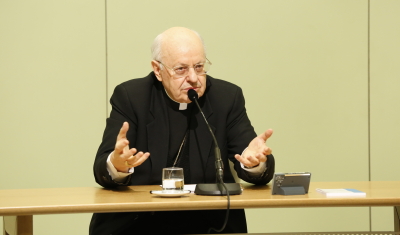
Feb 25, 2016 | Non categorizzato
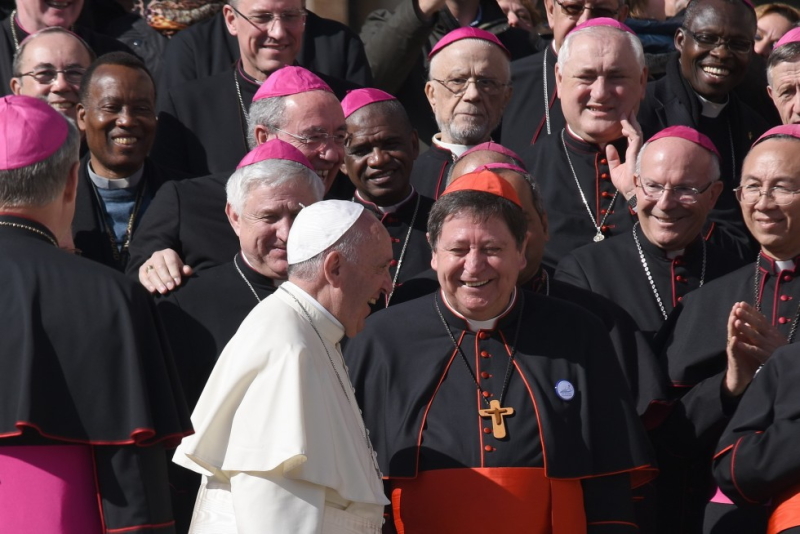 60 Bishop-friends of the Focolare Movement, representing 31 countries (Iraq, Lebanon, Syria, Bénin, Cameroon, Ivory Coast, Ethiopia, Madagascar, Democratic Rep.of Congo, Tanzania, Thailand, India, Pakistan, Brazil, Venezuela, Panama, U.S.A., Uruguay, Austria, Spain, France, Great Britain, Ireland, Italy, Portugal, Czech Rep., Latvia, the Rep.of Moldova, Romania, Ukraine, Hungary.), are presently gathered at Castelgandolfo (22-26 February). The participation at the General Audience held by Pope Francis at St. Peter’s Square has been the central point of this meeting. In his address the Pope urged the Bishops “to always keep alive the charism of unity in the apostolic ministry, in communion with the successor of Peter”. “A synodal Church is a Church that listens, that realizes that listening ‘is more than simply hearing’. It is a mutual listening in which everyone has something to learn.” This type of Church, as defined by the Pope during the ceremony commemorating the 50th anniversary of the institution of the Synod of Bishops, indicates the track to be followed during this conference. The choice of the title “A Church which generates unity” stems from the belief that, at a time marked by tensions and increasing disintegration, the people of God are called to contribute in a vital manner towards building relationships at all levels and in all environments. This has to be lived, first of all, within the Church itself and its source must be in the heart of a merciful God. The core of this theme lies in understanding Jesus’ prayer to the Father for unity (Jn 17), as “ gift, commitment and achievement”. Maria Voce, president of the Focolare Movement and Jesús Morán, co-president spoke about this approach in the light of Chiara Lubich’s charism.
60 Bishop-friends of the Focolare Movement, representing 31 countries (Iraq, Lebanon, Syria, Bénin, Cameroon, Ivory Coast, Ethiopia, Madagascar, Democratic Rep.of Congo, Tanzania, Thailand, India, Pakistan, Brazil, Venezuela, Panama, U.S.A., Uruguay, Austria, Spain, France, Great Britain, Ireland, Italy, Portugal, Czech Rep., Latvia, the Rep.of Moldova, Romania, Ukraine, Hungary.), are presently gathered at Castelgandolfo (22-26 February). The participation at the General Audience held by Pope Francis at St. Peter’s Square has been the central point of this meeting. In his address the Pope urged the Bishops “to always keep alive the charism of unity in the apostolic ministry, in communion with the successor of Peter”. “A synodal Church is a Church that listens, that realizes that listening ‘is more than simply hearing’. It is a mutual listening in which everyone has something to learn.” This type of Church, as defined by the Pope during the ceremony commemorating the 50th anniversary of the institution of the Synod of Bishops, indicates the track to be followed during this conference. The choice of the title “A Church which generates unity” stems from the belief that, at a time marked by tensions and increasing disintegration, the people of God are called to contribute in a vital manner towards building relationships at all levels and in all environments. This has to be lived, first of all, within the Church itself and its source must be in the heart of a merciful God. The core of this theme lies in understanding Jesus’ prayer to the Father for unity (Jn 17), as “ gift, commitment and achievement”. Maria Voce, president of the Focolare Movement and Jesús Morán, co-president spoke about this approach in the light of Chiara Lubich’s charism.

Cardinal Lorenzo Baldisseri
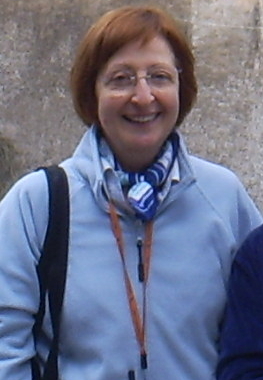
Feb 24, 2016 | Focolare Worldwide
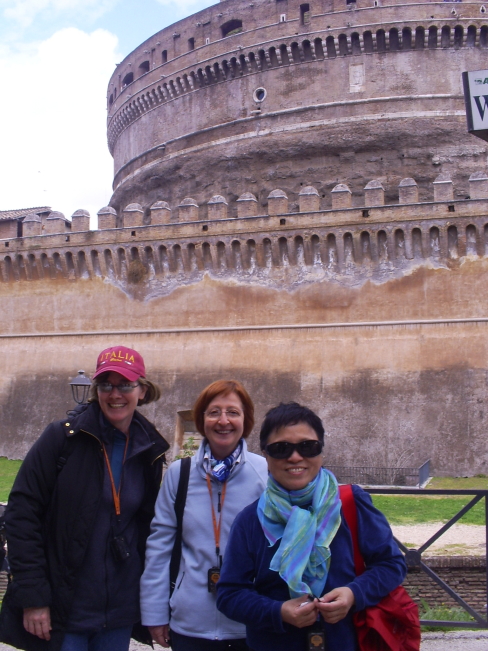
Maria Grazia Brusadelli (centre)
 At the moment, it is probably the most “extreme” periphery. Now Maria Grazia is preparing her documents for the move and visiting her relatives to inform them of her decision. She would still have time to change her mind, since the reports of new hostilities. A few days ago there was news of a bomb being detonated at a Doctors Without Borders hospital in Arat al Numan, leaving 8 dead and 40,000 people without medical care in an area of conflict. The killing of a young Caritas volunteer in Aleppo was also reported. Maria Grazia, what effect do these news reports have on you? Are you having any second thoughts? “Absolutely not. It’s true, each tragic news report is like an arrow to the heart. But I’m not afraid. Even though I’m well aware of the risks, I don’t fear for myself. I think of the people living there, and I already want to be with them to share their pain, to bring them – at least by being there, since I don’t speak Arabic – a little bit of hope. I’d like to already be there to make them feel the support and the nearness of Focolare members around the world who pray for them every day that peace will return to Syria. The Syrians with whom we are in contact are very grateful for this global participation and for all that’s being done on the ground to alleviate their hardship. I’d also like to already be there to bring them the love and hope of the Church. I’ll have the opportunity to meet with the Holy Father before going, and so I’ll be able to give them a message from him. In Damascus there are three women focolarini waiting for me, and the men focolarini in Aleppo. They live in close communion with the people in Syria who have embraced the spirituality of unity, and there’s the ecumenical and interreligious dialogue that’s very much alive among the locals. Because the Focolare – wherever it is in the world – has the spirit of a family, both among the members and with everyone else.”
At the moment, it is probably the most “extreme” periphery. Now Maria Grazia is preparing her documents for the move and visiting her relatives to inform them of her decision. She would still have time to change her mind, since the reports of new hostilities. A few days ago there was news of a bomb being detonated at a Doctors Without Borders hospital in Arat al Numan, leaving 8 dead and 40,000 people without medical care in an area of conflict. The killing of a young Caritas volunteer in Aleppo was also reported. Maria Grazia, what effect do these news reports have on you? Are you having any second thoughts? “Absolutely not. It’s true, each tragic news report is like an arrow to the heart. But I’m not afraid. Even though I’m well aware of the risks, I don’t fear for myself. I think of the people living there, and I already want to be with them to share their pain, to bring them – at least by being there, since I don’t speak Arabic – a little bit of hope. I’d like to already be there to make them feel the support and the nearness of Focolare members around the world who pray for them every day that peace will return to Syria. The Syrians with whom we are in contact are very grateful for this global participation and for all that’s being done on the ground to alleviate their hardship. I’d also like to already be there to bring them the love and hope of the Church. I’ll have the opportunity to meet with the Holy Father before going, and so I’ll be able to give them a message from him. In Damascus there are three women focolarini waiting for me, and the men focolarini in Aleppo. They live in close communion with the people in Syria who have embraced the spirituality of unity, and there’s the ecumenical and interreligious dialogue that’s very much alive among the locals. Because the Focolare – wherever it is in the world – has the spirit of a family, both among the members and with everyone else.”
Feb 23, 2016 | Non categorizzato
Chiara Lubich lived on this earth from January 22, 1920 until March 14, 2008. On the day she died thousands of people filled the streets of Rocca di Papa where the International Headquarters of the Focolare Movement is located as well as Chiara’s house. They were there to pay their final respects, and even larger crowds attended her funeral at the Basilica of St. Paul’s Outside the Walls. In the years that followed, her anniversary became an occasion to reflect on different aspects of the life, witness and thought of Chiara Lubich: ecumenical dialogue (Trent, 2012); the charism of unity and young people (2012); charism, history, culture (2013); interreligious dialogue (2014); politics for unity (2015). On January 27th of the same year there was the official opening of the Cause of Canonisation. In 2016 the focus will be on peace. Chiara Lubich was a peacemaker. She opened paths of dialogue at many levels and was internationally recognised, like when she was awarded the UNESCO Prize For Peace Education in 1996. Her spirituality, which also translates into the daily practice of universal brotherhood, has inspired hundreds of projects around the world that are aimed at enriching the world with humanity and solidarity through caring for Creation. These projects are all gathered in the United World Project (UWP). https://www.youtube.com/watch?v=TR_MvehHeIk While responding to Pope Francis’s appeal, on behalf of the Movement, Focolare president Maria Voce called for new commitment and effort in favour of peace. “We have to do more,” she said, to move the top politicians, the weapons trade networks and the chief strategists who – as we are beginning to see – can start off from the bottom with the mobilisation of civil society.” Maria Voce also called on the members of the Movement “to join in more with others” with others who are moving in this direction, to promote actions that unmask the causes of war and of the tragedies that afflict so many parts of the earth, with the goal of remedying them, “putting our own forces into play, our willingness and resources.” One event titled Culture of Dialogue, A Way To Build Peace, with a special appearance by the Gen Verde international band, will be held at Castel Gandolfo, Italy, on March 12th. These events will mark the 20th anniversary of the conferment of the UNESCO Prize For Peace Education to Chiara Lubich. The invitation is addressed to ambassadors to the Holy See, civil and Church leaders. Focolare president Maria Voce will give an address, which will be followed by several testimonies regarding dialogue as a way to build peace. On March 14th a Mass will be celebrated by Cardinal João Braz De Aviz at the Shrine of Our Lady of the Divine Love, while other events to remember Chiara are being held throughout the world.
Feb 23, 2016 | Non categorizzato
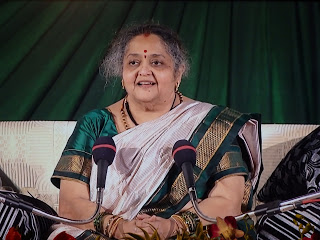
Feb 22, 2016 | Non categorizzato
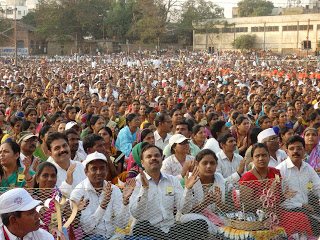 The city of Kolhapur hosted the meeting with some 50 thousand members and sympathisers of the Swadhyaya Movement which was founded by the Hindu reformer Pandurang Shastri Athawale and is currently guided by his daughter, Didi. A harmonious blend of ideals and intentions was born from the friendship between Didi and Chiara Lubich that grew over the years and continued with the election of Maria Voce Focolare president. Following the meetings between the women who succeeded the founders of those two movements, Maria Voce, Jesús Morán and the delegation from the Movement in Italy were invited to take part in the closing ceremony of a pilgrimage with some ten thousand couples from the Swadhyay Parivar Movement. The couples, who have been involved in the Hindu renewal movement, spent a week in contact with other families from the Kolhapur region sharing with them the ideals and spiritual life of their movement and paying a visit to the important temple of that region.
The city of Kolhapur hosted the meeting with some 50 thousand members and sympathisers of the Swadhyaya Movement which was founded by the Hindu reformer Pandurang Shastri Athawale and is currently guided by his daughter, Didi. A harmonious blend of ideals and intentions was born from the friendship between Didi and Chiara Lubich that grew over the years and continued with the election of Maria Voce Focolare president. Following the meetings between the women who succeeded the founders of those two movements, Maria Voce, Jesús Morán and the delegation from the Movement in Italy were invited to take part in the closing ceremony of a pilgrimage with some ten thousand couples from the Swadhyay Parivar Movement. The couples, who have been involved in the Hindu renewal movement, spent a week in contact with other families from the Kolhapur region sharing with them the ideals and spiritual life of their movement and paying a visit to the important temple of that region.  At the ceremony, which was held on a large plaza in the centre of the city, Didi Talwalkar told everyone about her friendship with Chiara Lubich, presenting Chiara as a Catholic leader and foundress of the Focolare Movement. Following a projection of photos showing the deep relationship between the two women, Maria Voce was asked to offer a greeting and the blessing of Chiara in the spirit of dialogue and shared membership in one human family as is written in the holy books of Hinduism like the vasudhavaiva kutumbakan. It was a very intense spiritual and emotional moment which strengthened the bond between the leaders of the two movements. The journey of these years has been a new experience of dialogue among the different relgions of India and Christians in the light of the spirituality of unity. It has been an experience of deep brotherhood at a living, but also intellectual level with valuable social projects. It continues to open paths of dialogue and knowledge of each other’s faith, in the light of the charism of Chiara Lubich, seen as a woman who knew how to read the signs of the times and who knew how to offer the world a spirit that could join everyone in a journey towards the Truth. The dialogue with Maria Voce and Jesús Morán during the February 13th telephone link-up ended with a question: “In the vast Hindu world where Christians are barely 2% of a population that exstends beyond one billion, what kind of impression does that leave you with? The Focolare president answered: “[It leaves me with the impression] of a small but alive Church, very alive.” “India is a large gift,” the co-president added. “They are very in favour of pluralism, and live it in an inclusive manner. They make space for each person to express their faith explicitly. This is a gift for the West, which lives pluralism in an almost excluding manner. Another thing is silence. Silence is necessary for every type of dialogue. Without interior and interpersonal silence, dialogue doesn’t have stand a chance.” Maria Voce concluded: “And this silence expresses the religious soul of the Indian people. As they said themselves: the gift that they can give the West is to make it rediscover the sense of God, sensing, feeling God.” See also: In India: a dialogue of hearts and minds
At the ceremony, which was held on a large plaza in the centre of the city, Didi Talwalkar told everyone about her friendship with Chiara Lubich, presenting Chiara as a Catholic leader and foundress of the Focolare Movement. Following a projection of photos showing the deep relationship between the two women, Maria Voce was asked to offer a greeting and the blessing of Chiara in the spirit of dialogue and shared membership in one human family as is written in the holy books of Hinduism like the vasudhavaiva kutumbakan. It was a very intense spiritual and emotional moment which strengthened the bond between the leaders of the two movements. The journey of these years has been a new experience of dialogue among the different relgions of India and Christians in the light of the spirituality of unity. It has been an experience of deep brotherhood at a living, but also intellectual level with valuable social projects. It continues to open paths of dialogue and knowledge of each other’s faith, in the light of the charism of Chiara Lubich, seen as a woman who knew how to read the signs of the times and who knew how to offer the world a spirit that could join everyone in a journey towards the Truth. The dialogue with Maria Voce and Jesús Morán during the February 13th telephone link-up ended with a question: “In the vast Hindu world where Christians are barely 2% of a population that exstends beyond one billion, what kind of impression does that leave you with? The Focolare president answered: “[It leaves me with the impression] of a small but alive Church, very alive.” “India is a large gift,” the co-president added. “They are very in favour of pluralism, and live it in an inclusive manner. They make space for each person to express their faith explicitly. This is a gift for the West, which lives pluralism in an almost excluding manner. Another thing is silence. Silence is necessary for every type of dialogue. Without interior and interpersonal silence, dialogue doesn’t have stand a chance.” Maria Voce concluded: “And this silence expresses the religious soul of the Indian people. As they said themselves: the gift that they can give the West is to make it rediscover the sense of God, sensing, feeling God.” See also: In India: a dialogue of hearts and minds
![Unity, the leaven of society]()
Feb 21, 2016 | Non categorizzato
 “The lines of John’s Gospel converge in the sentence which for quite some time has had deep and infinite meaning for me: ‘. . . may all be one. As you, Father, are in me and I am in you, may they also be in us, so that the world may believe that you have sent me’ (see Jn 17:21). This is how we are to live. [. . .] the Unity of the Church, the unity of those that find themselves beyond the confines of our Roman Catholic Church, the unity amongst all those who acknowledge faith in the one God, the Living One, and therefore with Jews and Muslims. That unity between Church and society in which the one does not find itself beside the other in a parallel sense or in an oppositional way, but Church and society enter into a reciprocal relationship, highlighting the fact that the unity which God gives is the leaven of society, the leaven that makes man free. It is the unity that makes us truly free, because we can only be ourselves in the fullest sense only where God has the right to be God in the fullest sense and therefore can give us everything He wishes to give us. And He doesn’t wish to give us anything less than His own interior mystery: Trinitarian unity. [. . .] But this is not a mere programme, because you never get very far with programmes. It must above all become life [. . .] I also have to begin to live this unity. And for this reason I trust in the fact that all of you, dear brothers and sisters, will help me, and that we can do this together, in reciprocity.” Bishop Klaus Hemmerle Source: W. Hagemann, Klaus Hemmerle innamorato della Parola di Dio, (Rome: Città Nuova, Rome, 2013) p. 337-338.
“The lines of John’s Gospel converge in the sentence which for quite some time has had deep and infinite meaning for me: ‘. . . may all be one. As you, Father, are in me and I am in you, may they also be in us, so that the world may believe that you have sent me’ (see Jn 17:21). This is how we are to live. [. . .] the Unity of the Church, the unity of those that find themselves beyond the confines of our Roman Catholic Church, the unity amongst all those who acknowledge faith in the one God, the Living One, and therefore with Jews and Muslims. That unity between Church and society in which the one does not find itself beside the other in a parallel sense or in an oppositional way, but Church and society enter into a reciprocal relationship, highlighting the fact that the unity which God gives is the leaven of society, the leaven that makes man free. It is the unity that makes us truly free, because we can only be ourselves in the fullest sense only where God has the right to be God in the fullest sense and therefore can give us everything He wishes to give us. And He doesn’t wish to give us anything less than His own interior mystery: Trinitarian unity. [. . .] But this is not a mere programme, because you never get very far with programmes. It must above all become life [. . .] I also have to begin to live this unity. And for this reason I trust in the fact that all of you, dear brothers and sisters, will help me, and that we can do this together, in reciprocity.” Bishop Klaus Hemmerle Source: W. Hagemann, Klaus Hemmerle innamorato della Parola di Dio, (Rome: Città Nuova, Rome, 2013) p. 337-338.









 The city of Kolhapur hosted the meeting with some 50 thousand members and sympathisers of the
The city of Kolhapur hosted the meeting with some 50 thousand members and sympathisers of the  “The lines of John’s Gospel converge in the sentence which for quite some time has had deep and infinite meaning for me: ‘. . . may all be one. As you, Father, are in me and I am in you, may they also be in us, so that the world may believe that you have sent me’ (see Jn 17:21). This is how we are to live. [. . .] the Unity of the Church, the unity of those that find themselves beyond the confines of our Roman Catholic Church, the unity amongst all those who acknowledge faith in the one God, the Living One, and therefore with Jews and Muslims. That unity between Church and society in which the one does not find itself beside the other in a parallel sense or in an oppositional way, but Church and society enter into a reciprocal relationship, highlighting the fact that the unity which God gives is the leaven of society, the leaven that makes man free. It is the unity that makes us truly free, because we can only be ourselves in the fullest sense only where God has the right to be God in the fullest sense and therefore can give us everything He wishes to give us. And He doesn’t wish to give us anything less than His own interior mystery: Trinitarian unity. [. . .] But this is not a mere programme, because you never get very far with programmes. It must above all become life [. . .] I also have to begin to live this unity. And for this reason I trust in the fact that all of you, dear brothers and sisters, will help me, and that we can do this together, in reciprocity.”
“The lines of John’s Gospel converge in the sentence which for quite some time has had deep and infinite meaning for me: ‘. . . may all be one. As you, Father, are in me and I am in you, may they also be in us, so that the world may believe that you have sent me’ (see Jn 17:21). This is how we are to live. [. . .] the Unity of the Church, the unity of those that find themselves beyond the confines of our Roman Catholic Church, the unity amongst all those who acknowledge faith in the one God, the Living One, and therefore with Jews and Muslims. That unity between Church and society in which the one does not find itself beside the other in a parallel sense or in an oppositional way, but Church and society enter into a reciprocal relationship, highlighting the fact that the unity which God gives is the leaven of society, the leaven that makes man free. It is the unity that makes us truly free, because we can only be ourselves in the fullest sense only where God has the right to be God in the fullest sense and therefore can give us everything He wishes to give us. And He doesn’t wish to give us anything less than His own interior mystery: Trinitarian unity. [. . .] But this is not a mere programme, because you never get very far with programmes. It must above all become life [. . .] I also have to begin to live this unity. And for this reason I trust in the fact that all of you, dear brothers and sisters, will help me, and that we can do this together, in reciprocity.”